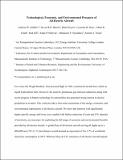| dc.contributor.author | Schäfer, Andreas W. | |
| dc.contributor.author | Barrett, Steven R. H. | |
| dc.contributor.author | Doyme, Khan | |
| dc.contributor.author | Dray, Lynnette M. | |
| dc.contributor.author | Gnadt, Albert Reuben. | |
| dc.contributor.author | Self, Rod | |
| dc.contributor.author | O’Sullivan, Aidan | |
| dc.contributor.author | Synodinos, Athanasios P. | |
| dc.contributor.author | Torija, Antonio J. | |
| dc.date.accessioned | 2020-08-19T19:47:56Z | |
| dc.date.available | 2020-08-19T19:47:56Z | |
| dc.date.issued | 2018-12 | |
| dc.date.submitted | 2017-11 | |
| dc.identifier.issn | 2058-7546 | |
| dc.identifier.uri | https://hdl.handle.net/1721.1/126682 | |
| dc.description.abstract | Ever since the Wright brothers’ first powered flight in 1903, commercial aircraft have relied on liquid hydrocarbon fuels. However, the need for greenhouse gas emission reductions along with recent progress in battery technology for automobiles has generated strong interest in electric propulsion in aviation. This Analysis provides a first-order assessment of the energy, economic and environmental implications of all-electric aircraft. We show that batteries with significantly higher specific energy and lower cost, coupled with further reductions of costs and CO₂ intensity of electricity, are necessary for exploiting the full range of economic and environmental benefits provided by all-electric aircraft. A global fleet of all-electric aircraft serving all flights up to a distance of 400–600 nautical miles (741–1,111 km) would demand an equivalent of 0.6–1.7% of worldwide electricity consumption in 2015. Although lifecycle CO₂ emissions of all-electric aircraft depend on the power generation mix, all direct combustion emissions and thus direct air pollutants and direct non-CO₂ warming impacts would be eliminated. | en_US |
| dc.description.sponsorship | National Science Foundation (Grant 1122374) | en_US |
| dc.language.iso | en | |
| dc.publisher | Springer Science and Business Media LLC | en_US |
| dc.relation.isversionof | http://dx.doi.org/10.1038/s41560-018-0294-x | en_US |
| dc.rights | Article is made available in accordance with the publisher's policy and may be subject to US copyright law. Please refer to the publisher's site for terms of use. | en_US |
| dc.source | other univ website | en_US |
| dc.title | Technological, economic and environmental prospects of all-electric aircraft | en_US |
| dc.type | Article | en_US |
| dc.identifier.citation | Schäfer, Andreas W. et al. "Technological, economic and environmental prospects of all-electric aircraft." Nature Energy 4, 2 (December 2018): 160–166 © 2018 The Author(s) | en_US |
| dc.contributor.department | Massachusetts Institute of Technology. Laboratory for Aviation and the Environment | en_US |
| dc.contributor.department | Massachusetts Institute of Technology. Department of Aeronautics and Astronautics | en_US |
| dc.relation.journal | Nature Energy | en_US |
| dc.eprint.version | Author's final manuscript | en_US |
| dc.type.uri | http://purl.org/eprint/type/JournalArticle | en_US |
| eprint.status | http://purl.org/eprint/status/PeerReviewed | en_US |
| dc.date.updated | 2019-10-24T12:45:15Z | |
| dspace.date.submission | 2019-10-24T12:45:19Z | |
| mit.journal.volume | 4 | en_US |
| mit.journal.issue | 2 | en_US |
| mit.metadata.status | Complete | |
